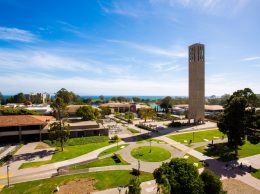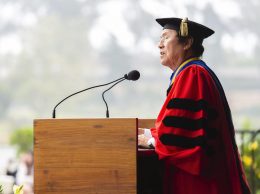
Henry Dubroff
Nearly six months after the tragic killings that left seven people dead in Isla Vista, UC Santa Barbara has taken the initial, tentative steps toward re-examining how to better integrate the off-campus community into the rest of the South Coast.
We still don’t have a final report from Sheriff Bill Brown on what happened the night of May 23, when Elliot Roger killed six people, injured more than a dozen others and then likely committed suicide.
But an independent committee of the UCSB Foundation Board of Trustees has produced a series of recommendations to bring Isla Vista under control. To their credit, the committee looked beyond the events of May 23 and took a look at the culture that created a series of breakdowns in authority that took place last spring.
According to a statement from the university, the recommendations include creating “an effective governing mechanism” as its top priority. And the report cites the need for UCSB to develop an administrative structure that is “equipped to address the challenges of Isla Vista.”
Creating a governing body for Isla Vista is going to be difficult and the committee recommended a semi-autonomous community services/municipal improvement district that would have authority over infrastructure, police, fire, security and roads.
The lack of a governance structure exacerbates wider community concerns “regarding the security and welfare of the residents of this college community,” said developer Mark Linehan, a UCSB Foundation Trustee, in a statement.
The committee also recommended vastly improved data collection about crimes and community policing, establishing a neighborhood justice court and creating a dedicated deputy district attorney to oversee the administration of justice at Isla Vista.
Reading through other aspects of the report, it’s clear that the Trustees are counting on cooperation from landlords, from the administration at Santa Barbara City College, whose students heavily populate Isla Vista, from the cities of Goleta and Santa Barbara and from the county itself.
“It will take an enormous amount of heavy lifting from both the local stakeholders and government officials along with UC Santa Barbara,” said Linehan, who among other things developed the Camino Real shopping center that’s a staple for residents of Isla Vista and the South Coast.
After some 125 meetings with various constituencies — including students as well as businesses — and consultation with a number of outside experts, the UCSB trustees have made a good start with their initial advisory committee recommendations.
But there are plenty of obstacles to getting started. For one thing, Santa Barbara County no longer has the handy tool of a Redevelopment Authority or RDA, with which to create economic incentives for development efforts. Indeed, as the report makes clear, it was the 2012 termination of the RDA program by Gov. Jerry Brown, that killed a citizens oversight board and contributed to the out-of-control atmosphere that pervaded Isla Vista over the past couple of years.
Creating a new semi-autonomous municipal improvement district will require rare collaboration between Goleta and Santa Barbara, as well as county officials. And it will have to create a new entity that will have to have its own sources of revenue whether they are user fees, TOT taxes, retail sales taxes or a portion of property taxes. None of these are going to be easy for Santa Barbara County, severely lacking for revenue to support a huge pension shortfall, to hand over to a new, untested entity.
However, there is no question that something needs to be done with Isla Vista. And with UCSB Chancellor Henry Yang standing squarely behind the recommendations which he called “a strong foundation,” there is a lot of momentum behind moving forward.
To truly honor those who were killed on May 23, it is important that the recommendations not just sit on a shelf. The real heavy lifting will be in figuring out how to finance the transition to a new governance scheme for Isla Vista.
It will not be an inexpensive transition, but for the sake of the region and its reputation, it might be one of the best investments our governments and UCSB could make.






 Print
Print Email
Email
















